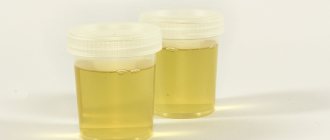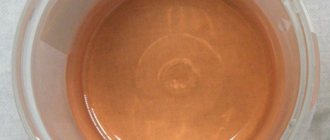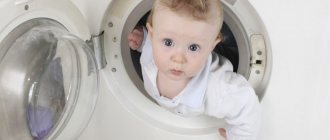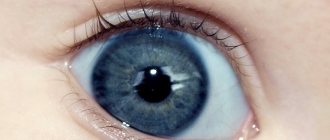Normally, urine has a color range from pale to deep yellow. It depends on your diet and consumption of various drinks. But color changes also often signal the development of a disease in the human body. A baby's urine can change color throughout the year, as all its organs adapt to life in the environment. In an older child, it becomes an indicator of problems within him, so parents should pay more attention to this detail.
It happens that the fluid secreted by the kidneys becomes brownish, reddish or cloudy, but not every mother knows what this indicates. Therefore, let's look at the situation in more detail.
What causes urine color to change?
There are quite a few reasons why urine turns into one color or another. It is affected by metabolism, the amount of metabolites, and the volume of fluid excreted. In children, the color of urine depends on age. For example, in a newly born baby it will be almost colorless, and in the first few weeks a reddish tint is possible. Infants pee with a light yellow liquid. An older child's urine is different from that of an adult; it is much lighter.
Products can also change the color of fluid excreted from the body. Carrots make it orange, beets pink or red, asparagus green. And these are not all vegetables that are capable of staining urine. When the urine changes color during the treatment period, then this is the effect of the drugs. This property is always indicated in the instructions. Regular vitamins often make urine bright yellow.
But in most cases, such changes can characterize pathological processes and diseases in the body. Each color means a different disease:
- Dark yellow urine comes out as a result of burns or dehydration. It may also indicate an infectious disease and congestion in the kidneys,
- lack of color is a sign of diabetes, kidney failure,
- almost black urine is possible with alkaptonuria or malnosarcoma,
- red color indicates blood has entered the urine. This phenomenon occurs with tumors of the urinary system, kidney infarction or urolithiasis,
- when jaundice activates, it may change to a green-yellow color,
- The formation of kidney stones can cause yellow urine with sediment,
- the liver and gall bladder “scream” about their illness through brown discharge from the kidneys,
- urine mixed with flakes indicates cystitis, urethritis, and kidney inflammation.
This is not the entire list of diseases that change urine. Therefore, it is so important to consult a doctor if there are any deviations in its color. After conducting a full examination and tests, he will be able to find out the true cause.
Causes

Timely medical attention requires detection of symptoms of rickets (vitamin D deficiency) in an infant. Healthy children do not complain of discomfort and pain, and do not act up without reason. The color of their urine is transparent, giving off a light yellow tint. The smell of urine in infants is neutral. The pungent aroma becomes obvious only under certain conditions associated with disorders of the urinary system, kidneys, liver and other organs. However, the reason for the smell of urine may lie in more prosaic things. Lack of care or the wrong brand of diapers can easily cause an unpleasant odor. It is not difficult to check whether the roots of negative changes are hidden in this. You need to free the newborn or newborn from the diaper and collect the urine in a sterile container, and then compare the results. If in this way it was possible to establish the origins of the problem, eliminating it will not be difficult. Change your baby's bed regularly and try a different brand of diapers.
For children who have crossed the threshold of the first year of life, this list also includes one more item - a type of underwear. It is important to buy natural cotton panties for your child. By following these simple rules, you can ensure that the unpleasant smell will completely stop bothering you, and the health of your beloved offspring will become much stronger.
A sharp or strange aroma of urine is a reason to be wary at any age.
If a child’s urine smells strongly at the age of 12-16, this may be a consequence of a “rebellion of hormones.” Naturally, everything will return to normal after some time, but parents need to be vigilant and take care of teaching their older children the basics of intimate hygiene. Under other circumstances, a strong smell of urine is an excuse to immediately contact a pediatrician, who will prescribe additional examinations and select adequate treatment methods in accordance with the transcript of the tests received.
The strong smell of ammonia, reminiscent of ammonia, is explained by dysfunction of the breakdown of amino acids, based on a lack of calcium and phosphorus compounds. A few months after birth (especially if the child was born in autumn or winter), the reserves of these substances in his body are depleted. Replenishment of vitamin D deficiency usually occurs through active walks and exposure of the newborn to bright sun. If the balance of the spent component is not restored, the baby not only develops an unpleasant smell of urine, but also sleep deteriorates and sweating increases. He becomes moody and gets tired quickly. Pronounced rickets is emphasized by deformation of the bones of the sternum and ribs, and progressive curvature of the legs. The prognosis for cure is favorable. Proper therapy will allow you to completely forget about rickets and the ammonia smell of urine by 2-3 years.

Urine acquires an acidic tint in children due to dysfunction of the digestive tract. An unpleasant odor may cause the doctor to suspect the development of gastritis or inflammation of the duodenum. But more often a child’s urine smells strongly of ascorbic acid due to dysbacteriosis. It, in turn, can be triggered by the consumption of new products for the baby (chips, soda, chewing gum) or simple failure to comply with hygiene standards.
A number of reasons why a child’s urine smells strongly are of a genetic nature and are caused by congenital anomalies. The latter include liver dysfunction (fermentation disorders), due to which the breakdown of certain amino acids does not occur. Parents, as a rule, are notified about such pathologies in advance, since they are diagnosed in the maternity hospital. Therefore, the unpleasant odor of a baby’s urine is not a surprise to them.
What does a child’s urine smell like in these cases:
- Spoiled fish. Moreover, the fish spirit comes not only from urine. A strong odor can be felt from the baby’s body, the air he exhales, saliva and sweat;
- Maple syrup or burnt sugar. The disease is called leucinosis. Requires a long course of medication and lifelong diet;
- Mold or mice (phenylketonuria). The disease is accompanied by dysfunction of the central nervous system and developmental delay.
Acetonemia
In general, doctors have different interpretations of what urine smells like. Acetone amber is most often detected in a child. This symptom indicates an excess of ketone bodies in urine. Acetonemia is a disease that occurs mainly in very young patients. It develops against the background of an incorrectly selected diet, in which the vast majority of dishes are high in fat. An excess of meat broths, sweets, butter, and canned products leads to urine acquiring a sharp, unpleasant odor and acrid notes appearing in it.
Recommended topic:
Urine smell
Although acetone syndrome can also be provoked by the opposite situation - a sudden restriction in food, a sharp reduction in its calorie content. A child’s urine also smells like acetone after suffering stress or serious physical exertion. If your baby is overtired or worried, to prevent increased production of ketone bodies, give him something sweet (raisin decoction, tea with honey, glucose tablet or regular candy).
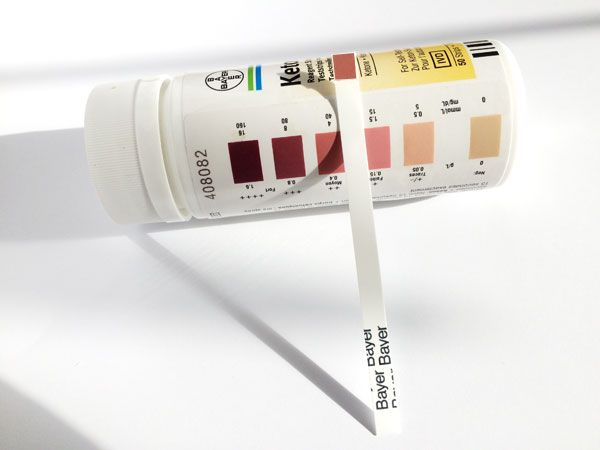
Test strip
However, if your child’s urine smells bad every time he goes to the toilet, and this is accompanied by other alarming factors, you need to start worrying. It is advisable to monitor the level of acetone in his urine using special test strips, which can be purchased at the pharmacy. If the readings are high and the symptoms do not go away, you should immediately go to the pediatrician. Perhaps we are talking about diabetes!
Diabetes
The sharp, strong smell of acetone can occasionally change its character. Sweet notes appear in it, it becomes cloying. Often, to determine this aroma, a comparison is made with the smell of soaked or ripe apples. If the parents’ sense of smell detects these shades in the child’s urine, immediate action is necessary. Visit the clinic and get tested to show your blood sugar levels (glucotests). When a child's urine smells like this, there is a chance that he has diabetes.
The development of this disease is accompanied by other symptoms. In addition to the fact that the child’s urine smells strong, he is tormented by thirst and itching, and his skin is extremely dry. The baby suddenly loses weight and his appetite worsens. Going to the toilet becomes more frequent, and pockets of inflammation may be found on the body, which are difficult to treat.
Nutritional Features
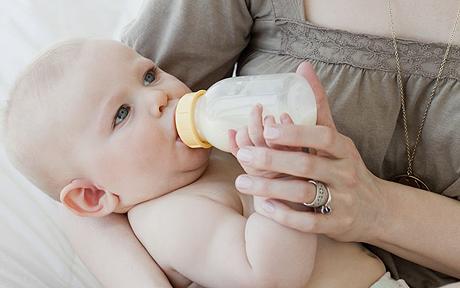
And yet, the unpleasant odor of urine in children is mainly associated with the peculiarities of the menu. For example, if a baby’s urine smells, this is probably a consequence of switching to a new formula (breast milk substitute) during artificial feeding, or a violation of the diet of the breastfeeding mother.
At an older age, a strong smell of urine may occur in children when transferring a younger family member to an “adult” table. While the baby’s body is being reconstructed, the parameters of the physiological fluid may change, up to its cloudiness and the appearance of suspicious-looking inclusions. Although, if we are not talking about pathology, then everything will go away on its own in a few days.
A child’s urine also smells pungent in other situations in which the characteristics of the child’s diet are also involved. A pungent aroma is caused by some foods, the abuse of which is contraindicated in young patients. This list includes:
- Garlic and horseradish;
- Hot seasonings, spices;
- Mushrooms and cabbage;
- Seafood;
- Smoked meats, marinades.
Excess cabbage, for example, causes a sulfur odor, and large amounts of smoked and fish dishes can give the urine a similar aroma.
Sometimes a child's urine smells strong, reminiscent of a pharmacy kiosk. This is also to some extent explained by the specifics of what the baby ingests. The sharp, unpleasant smell of penicillin can be observed after a serious illness (ARVI, influenza, sore throat, bronchitis), when the baby was forced to take antibiotics and other potent drugs for a long period.
Recommended topic:
Causes of unpleasant urine odor in men
Diseases of the urinary system
The stench of urine is an alarm signal given by the body in a difficult situation for it. Therefore, it is impossible to ignore the detected unpleasant odor. True, this may turn out to be a “false alarm”. In this case, all symptoms will disappear within 24 hours. If this does not happen, then there is an inflammatory process in the pelvic organs (kidneys, bladder, urethra). This means that we need to understand why a child’s urine smells, i.e. find out what kind of infection we are talking about.
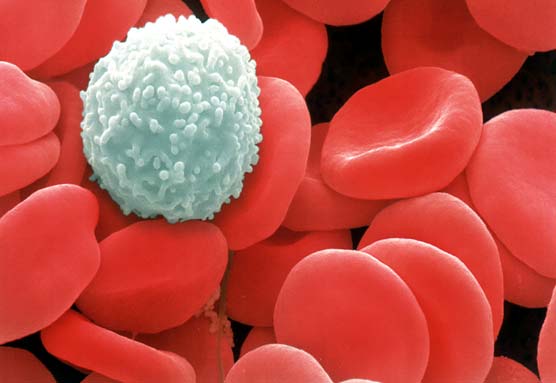
Leukocytes
A child’s body is no different from an adult’s (except for height, perhaps). So all the processes that are inherent in adults proceed in him according to the same principle and with the same intensity. The resulting inflammation activates the production of leukocytes - blood cells aimed at fighting infection that has entered the body. It is because of them that a child’s urine smells unpleasant. “Dead” leukocytes and pathological microorganisms are excreted along with physiological fluid – urine.
However, the strong smell of urine is accompanied by other symptoms. The baby rarely visits the restroom for minor needs, complains of pain in the groin and lower back, burning and stinging when emptying the bladder. In this case, the urine comes out cloudy, with various impurities (mucus, pus, blood, flakes, sediment). This clinical picture is typical for a group of kidney diseases and urinary tract inflammation:
- Urethritis;
- Pyelonephritis;
- Glomerulonephritis;
- Cystitis.
Water imbalance in the body
Of course, there is no point in rushing to conclusions. It happens that a child’s urine smells for completely different reasons. One of these reasons is dehydration. Impaired drinking regime (especially in summer) is fraught with dangerous consequences.
When a child drinks little, urine is excreted from the body less frequently. It becomes concentrated and, as a result, is saturated with pungent aromas. It’s not just the heat outside that can provoke an unpleasant smell of urine due to dehydration. An active, mobile baby who often sweats while playing should also drink more.

Acute respiratory viral diseases, poisoning, and diarrhea are also included in the list of reasons why a child’s urine smells strong. The logic here is simple - with high fever, nausea and vomiting, the child’s body loses a lot of fluid. If it is not replenished in time, dehydration is guaranteed!
Change in urine color in a child
The color of urine in newborns can range from yellow to deep straw. In children, its shade may also indicate various symptoms of disease, but this is not necessary. Very often, bright yellow urine in a child indicates an insufficient amount of fluid in the body.
If your baby’s urine has a bright yellow color for a long time or has completely changed color, it is better to play it safe and visit a pediatrician so as not to cause harm and not cause the disease. Color changes in the fluid leaving the kidneys in children mean the same diseases as in adults.
Why might the smell of urine change?
The baby's urine smells due to ammonia. Normally, when it gets into the pot, the “aroma” is weakly expressed and intensifies as it stays in the open air. If a pungent odor appears immediately after getting into the potty or diaper, there may be several reasons:
Before you sound the alarm, you need to think about which of the factors took place in your situation. If food is the cause, adjust your diet. You can find out whether the strong smell of urine in a child is a side effect of taking medications, in the official instructions for the drug. The absence of the first two factors indicates that you are faced with a disease.
As pathologies develop, urine may smell:
The appearance of a strong ammonia odor in infancy signals danger. The cause of the pathology may be a violation of a special diet by the nursing mother, heredity or the development of acquired diseases.
From all of the above, it follows that a child’s urine begins to smell for various reasons, and parents need to find out why. Observe the behavior of the baby: does he feel discomfort, is he capricious? Consulting a specialist will not be superfluous. If the unpleasant odor is accompanied by fever, loss of appetite and pain, call an ambulance.
In the process of growing up (at 1-2 years), the baby gets acquainted with a variety of products, and parents immediately begin to notice that the child’s urine from the age of one becomes yellower and acquires a specific smell, especially noticeable when it comes into contact with fabric. The causes of the ammonia smell of baby urine can be:
- excessive consumption of carbohydrate or protein foods;
- lack of useful macroelements in the daily diet;
- dehydration;
- eating foods containing chemical components (flavor and smell enhancers, preservatives, etc.).
In adolescence, urine can become smelly during the period of hormonal changes, with severe physical fatigue. Parents need to teach their child good intimate hygiene. If the urine smells like acetone or there is a fever, or a burning sensation is felt in the urinary tract, you should immediately go for a diagnosis.
What do we have to do?
When bright yellow urine appears, the first thing you should do is find out whether the child drinks enough fluids per day, eats foods containing dyes, and whether he overdoes it with physical exercise (this applies to older children). If during this period the baby was treated for any infection, it is advisable to read the instructions carefully. If this side effect is listed there, you don't have to worry or stop giving the medicine.
The main thing is not to panic. If you find out why the urine has changed in color, then you can rule out the sources of this and expect the color to normalize. When the reasons have not been clarified, and the urine continues to come out with an incomprehensible color, immediately consult a doctor.
In cases where a change in the color, smell and consistency of urine is accompanied by high temperature, pain, a feeling of fever, frequent urge to urinate, as well as nausea and vomiting, immediately call an ambulance and go to the hospital. Otherwise, serious consequences are possible.
